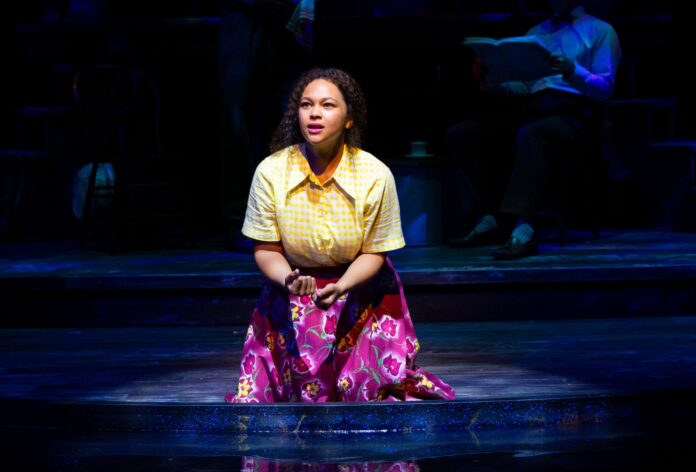Usually when one points to racial-topic work that’s aged poorly, it’s in reference to some Al Jolson- or Mickey Rooney-style pageantry that probably brought down the (all-white) house back way back when, but is stomach-churning to see today. It’s not often you see such a work from a marginalized artist, let alone a work that’s been nominated for a Pulitzer.
Bulrusher (through December 3 at Berkeley Rep) has all the makings of a landmark in Black playwrighting; it covers a rather unsung place and time in history; its primary focus is Black women; and it includes queerness during a time when that could have easily gotten someone killed. Unfortunately, Berkeley native Eisa Davis (from the ensemble of my favorite musical, Berkeley Rep’s own Passing Strange) didn’t feel the need to see any of those story threads through to their logical conclusions, leading her to bow down to cookie-cutter tropes and create an ending—nay, endings—that are an absolute mess.
Which is a shame, because 2007 Pulitzer nominee has a lot going for it in this production: the sets are gorgeous; the direction is assured; the performances are all watchable; and the story itself is engrossing.
Set in the racially integrated town of Booneville, CA in 1955, our story centers on the orphaned Bulrusher (Jordan Tyson), an 18-year-old light-skinned Black woman who primarily sells fruit when not secretly indulging in her ability to see one’s future in the water. She’d promised not to use her ability again at the behest of her guardian, a white schoolteacher nicknamed “Schoolch” (Jamie LaVerdiere). He can often be found at the local brothel, where he doesn’t indulge himself, but just socializes with the brothel’s white Madame (Shyla Lefner), and Logger (Jeorge Bennett Watson), a Black man and brothel regular.

Everyone is set into their normal routine, until it’s up-ended by the arrival of Alabama native and dark-skinned Black woman Vera (Cyndii Johnson). In fact, Vera is the first Black person Bulrusher has ever met, besides Logger, who happens to be Vera’s uncle. Despite the innocence of Vera’s arrival (she’s pregnant and “on vacation” to have the baby), her mere presence inspires Bulrusher to begin seeing the world differently—something that doesn’t go over well with her would-be white suitor (Rob Kellogg), her surrogate father Schoolch, or the tight-knit group who also start rethinking their set routines.
The potential should be obvious. Between the Madame providing Bulrusher with a strong business role mdoel and the arrival of Vera providing Bulrusher’s racial and sexual awakening, the first half of the show promises a refreshing perspective on Jim Crow-era tales; almost none of which take place in northern California. Sure, that first half is imperfect in how it tackles racism (a tidbit about discrimination against Native Americans is tossed out, but never really elaborated upon until it’s shoe-horned into the ending), but the setting and colorful characters make it a pleasure to watch and intrigue us for the second half.
Unfortunately, that second half undoes all the progress of the first. It’s hard to say how without going into spoilers, but rest assured: the play insists that queerness is just experimentation; that any woman considering abortion just needs to be talked out of it; and that racism isn’t the problem Black people make it out to be. It’s as if the play were trying to redirect racism accusations from white people so it could pat them on the back and say “It’s not your fault.” It’s not that Bulrusher’s newly inspired rage—once Vera tells her about Black kids being lynched—goes too far because it’s new and unfocused. No, this is the “What have white people ever done to you personally?” approach, insisting Vera and Bulrusher are in the wrong for being angry at white people for any reason. After all, a white man raised Bulrusher, so how could racism still exist?

These problems are further compounded by the play’s use of paper bag politics, showing the light-skinned Bulrusher as an innocent (if bright) babe in the woods and the dark-skinned Vera as the ignorant “darkie” who poisons the mind of the “mulatto” girl with rage and “sodomite” behavior. Nevermind the fact that Vera’s pregnancy is the result of being raped by a white cop, how dare she consider terminating the pregnancy!
Help us save local journalism!
Every tax-deductible donation helps us grow to cover the issues that mean the most to our community. Become a 48 Hills Hero and support the only daily progressive news source in the Bay Area.
Had the story as a whole been in the context of teaching us that race shouldn’t matter in regards to love and life, that would have been something. But this is the sort of conservative moralizing one would expect from a brow-beating Christian movie. In fact, I found myself reminded of the morally hypocritical work of Tyler Perry; the work that insists that (Black) women who cheat on their husbands are women who deserve to get AIDS. (Yes, that’s a real Tyler Perry story.)
As if that weren’t bad enough, the play goes on longer than necessary with multiple endings. It was like watching Wayne’s World and expecting someone to wave their hands and sing “doodly-doo, doodly-doo.” In fact, the proceedings seem to go from “the super-sad ending” to “the mega-happy ending” (wherein everyone lives heteronormatively ever after) to would-be tragedy to who-knows-what? It’s like Davis couldn’t commit to one logical conclusion, so she threw in every conclusion, whether they make sense or not.
At least this masked matinee featured an audience that seemed to (mostly) take the rule seriously. Once again, Berkeley Rep’s top-notch HVAC made for a rather cold theatre, but it also meant that my Aranet4’s CO² peaked around 830ppm before dropping down to about 772ppm by the end.
I don’t want to make unfair comparisons, but with the setting, subject matter, and supernatural elements, one can’t help but make comparisons to the film Eve’s Bayou. That film didn’t revolve around racism per se, but was a lot more mindful of the era and the toxicity of patriarchy. Bulrusher is a well-acted and -directed production of a script that starts off strong before devolving into self-misogynoir. It was wince-inducing when it premiered a decade-and-a-half ago, and is even more painful in a post-Roe/post-George Floyd US.
BULRUSHER runs through December 3 in the Peet’s Theatre at Berkeley Rep. Tickets and further info here.





